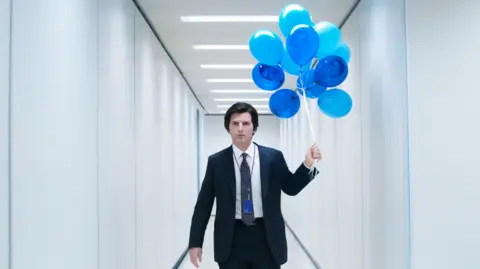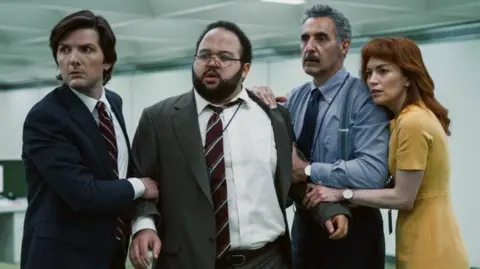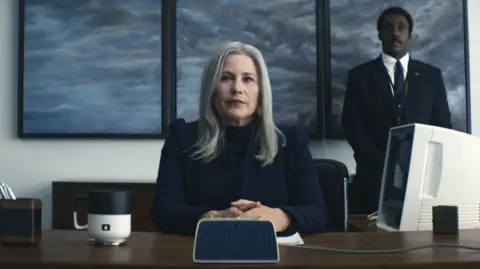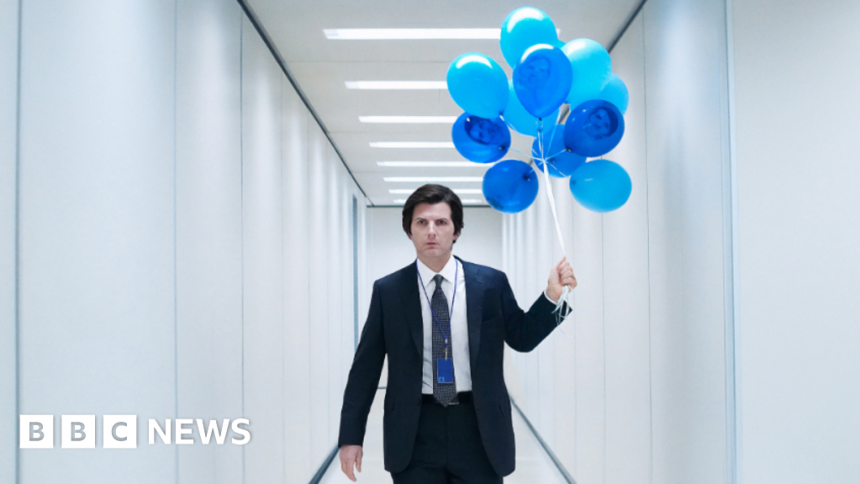Severance: Back to the sci-fi workplace where you literally sell your soul
 Apple TV
Apple TVSpoiler warning for season two’s opening episode
“I don’t think Mark, in the wildest reaches of his imagination, thought his company could do something as nefarious as faking a death,” says actor Adam Scott of his character in Apple TV’s Severance.
But Mark’s is an unusual workplace, to put it mildly.
Employees at biotech conglomerate Lumon Industries are offered the company’s pioneering severance programme, a concept inspired by series creator Dan Erickson’s desire to escape the mind-numbing drudgery of his office jobs.
Sold as the ultimate work-life balance, the firm’s brain microchip procedure splits a person’s consciousness and memory into dual existences.
This means when “severed” grieving widower Mark Scout and his colleagues take the office lift each morning, their work-self – or “innie” – awakens for duty. Once they clock off, their “outie” re-emerges, returning to home life blissfully unaware.
But series one’s cliffhanger finale – the work of executive producer and director Ben Stiller – saw Mark discover his late wife Gemma may actually still be alive amid a rebellion by his team against their shadowy employers.
The group managed to outsmart floor managers Harmony Cobel (Patricia Arquette) and Milchick (Tramell Tillman) and override the severance system, briefly awakening their real-world bodies. Rebellious sceptic Helly (Britt Lowery) also learned a shattering truth about her outie’s company ties.
Fans have been waiting almost three years to find out what happens next, and on Friday, Severance returned to Apple TV for its anticipated second season.
 Apple TV
Apple TVThe show got critical acclaim in 2022 to become one of Apple’s breakout hits – earning 14 Emmy nominations and a Writers Guild award. It helped, too, that the show arrived at a time when the pandemic had fundamentally shifted the audience’s own relationship with office life.
But the Hollywood writers’ strike and behind-the scenes issues (resolved for Stiller to return to produce and direct), forced the wait that left audiences hungry for answers.
I ask Scott, who, fittingly, has never worked a real office job but played many office on-screen roles, how that cliffhanger has affected his latest character’s psyche on the show’s return.
“Mark is far more self-possessed and septical, possibly, of this company,” says the 51-year-old, who played manager Ben Wyatt in comedy Parks and Recreation.
Last season, trapped inside Lumon’s brutalist architecture and sanitised walls, crunching mysterious numbers for the “Macrodata Refinement team”, the team was fed cultish Soviet-esque propaganda about company founder Kier Eagan and his family.
Where previously, “Lumon and Kier and all of its rules and and regulations made up [the innies’] identities”, Scott says their brief escape into the outside world and the chance to taste their alternate existences has “filled them up”.
Rebel, rebel
If season one darkly satirised corporate greed and rebellion, season two lays bare disingenuous corporation damage control and co-option, in ways once again sure to spark Reddit theories. Nothing is quite as it seems.
Apple need the series to be popular, too, with each episode costing $20m (£16m) to make according to Bloomberg – a big investment given plans to rein in spending after years of streaming services disrupting the market.
In yesterday’s season opener, we saw Mark’s innie (newly sentient after his team’s brief escape into the outside world) return to work to find his team replaced.
Floor manager Milchick explains that in the five months since the uprising, fellow manager Harmony (known to workers as Ms. Cobel) has been fired, with himself promoted in her place. The team is also being promised workplace reform – including improved staff perks.
After all, nothing better conveyed Lumon’s unnerving forced fun than its heavily rationed waffle, melon and single-track dance parties. An HR video even reframes the team’s rebellion positively, encouraging staff to “praise Kier” for the uprising.
Mark’s attempts to reunite his team are thwarted by Milchick. But newly empowered by his trip to the outside world, he decides to challenge the shadowy forces that run the company directly.
This push and pull between Mark and a faceless employer may strike a chord with those being forced to go back into the office as companies clamp down on remote working post-pandemic. This month, the bank JPMorgan Chase reportedly closed comments on an intranet page announcing its return-to-work edict, following a tide of negative responses.
 Apple TV
Apple TVThis new series comes at a time when the balance of power is arguably shifting in favour of employers again, after a total of 100 million Americans quit their jobs in 2021 and 2022 in what Stanford economics professor Nicholas Bloom called the Great Resignation.
Disillusionment has sparked cultural shifts amongst office workers. The term ‘quiet quitting’ has emerged, referring to doing the bare minimum in a job. Similarly “late-stage capitalism” has gained traction on social media, not for its Marxist roots, but to describe perceived inequalities, societal burnout and a faltering system.
The board will (not) see you now
In series two, we see how Lumon’s disorientating, unforgiving corporate culture and its deceptive pleasantries affects those with power too. Floor managers Milchick and newly-demoted Harmony become victims as well as enforcers.
Arquette, who won an Oscar for Richard Linklater’s 2014 film Boyhood, says her character is “furious” that the corporation, in demoting her, has failed to recognise her loyalty.
Tillman similarly adds that whilst it is unclear whether Milchick betrayed Harmony, he bears a “heavy responsibility” on his shoulders. As her replacement, he must now both placate the innies and please a board who “do not understand what it takes to do the job”.
 Apple TV
Apple TVUnlike Scott, Tillman worked in corporate office roles prior to becoming an actor and landing his breakthrough role as company man Milchick. He says he was never as “arrogant or ambitious” as his character, but admits to occasionally being “adventurous” in navigating office politics. This either worked well or, sometimes, landed him “flat on my face”.
Tillman equally recognises Milchick’s isolated experience as the sole black managerial figure. Steering clear of spoilers, he says we begin to understand Milchick’s experience of being “othered by the company he serves”.
 Apple TV
Apple TV“It really speaks to how some organisations and some corporations, in their attempt to be inclusive, miss the boat,” he adds.
Arquette continues: “I feel every few years there’s a new doctrine throughout the corporate space – some kind of PR switcharoo [about] how to be current and different than we were in the past.
“I think a lot of times things do need to change, but sometimes it doesn’t really feel genuine.”
Anyone for a melon party?
Severance, season two, will stream weekly on Apple TV from 17 January






